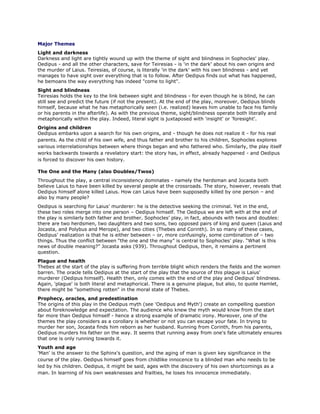
Major themes oedipus rex
- 1. Major Themes Light and darkness Darkness and light are tightly wound up with the theme of sight and blindness in Sophocles' play. Oedipus - and all the other characters, save for Teiresias - is 'in the dark' about his own origins and the murder of Laius. Teiresias, of course, is literally 'in the dark' with his own blindness - and yet manages to have sight over everything that is to follow. After Oedipus finds out what has happened, he bemoans the way everything has indeed "come to light". Sight and blindness Teiresias holds the key to the link between sight and blindness - for even though he is blind, he can still see and predict the future (if not the present). At the end of the play, moreover, Oedipus blinds himself, because what he has metaphorically seen (i.e. realized) leaves him unable to face his family or his parents in the afterlife). As with the previous theme, sight/blindness operate both literally and metaphorically within the play. Indeed, literal sight is juxtaposed with 'insight' or 'foresight'. Origins and children Oedipus embarks upon a search for his own origins, and - though he does not realize it - for his real parents. As the child of his own wife, and thus father and brother to his children, Sophocles explores various interrelationships between where things began and who fathered who. Similarly, the play itself works backwards towards a revelatory start: the story has, in effect, already happened - and Oedipus is forced to discover his own history. The One and the Many (also Doubles/Twos) Throughout the play, a central inconsistency dominates - namely the herdsman and Jocasta both believe Laius to have been killed by several people at the crossroads. The story, however, reveals that Oedipus himself alone killed Laius. How can Laius have been supposedly killed by one person – and also by many people? Oedipus is searching for Laius’ murderer: he is the detective seeking the criminal. Yet in the end, these two roles merge into one person – Oedipus himself. The Oedipus we are left with at the end of the play is similarly both father and brother. Sophocles’ play, in fact, abounds with twos and doubles: there are two herdsmen, two daughters and two sons, two opposed pairs of king and queen (Laius and Jocasta, and Polybus and Merope), and two cities (Thebes and Corinth). In so many of these cases, Oedipus’ realization is that he is either between – or, more confusingly, some combination of – two things. Thus the conflict between “the one and the many” is central to Sophocles’ play. “What is this news of double meaning?” Jocasta asks (939). Throughout Oedipus, then, it remains a pertinent question. Plague and health Thebes at the start of the play is suffering from terrible blight which renders the fields and the women barren. The oracle tells Oedipus at the start of the play that the source of this plague is Laius' murderer (Oedipus himself). Health then, only comes with the end of the play and Oedipus' blindness. Again, 'plague' is both literal and metaphorical. There is a genuine plague, but also, to quote Hamlet, there might be "something rotten" in the moral state of Thebes. Prophecy, oracles, and predestination The origins of this play in the Oedipus myth (see 'Oedipus and Myth') create an compelling question about foreknowledge and expectation. The audience who knew the myth would know from the start far more than Oedipus himself - hence a strong example of dramatic irony. Moreover, one of the themes the play considers as a corollary is whether or not you can escape your fate. In trying to murder her son, Jocasta finds him reborn as her husband. Running from Corinth, from his parents, Oedipus murders his father on the way. It seems that running away from one's fate ultimately ensures that one is only running towards it. Youth and age 'Man' is the answer to the Sphinx's question, and the aging of man is given key significance in the course of the play. Oedipus himself goes from childlike innocence to a blinded man who needs to be led by his children. Oedipus, it might be said, ages with the discovery of his own shortcomings as a man. In learning of his own weaknesses and frailties, he loses his innocence immediately.
